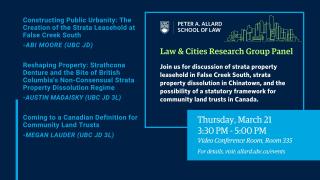Event Description
Join us for presentations and three person panel discussion of strata property leasehold interests in Vancouver’s False Creek South, strata property dissolution in Vancouver’s Chinatown, and the possibility of a statutory framework for community land trusts in Canada.
This event is in-person and online. To attend online, please e-mail a request to nunez@allard.ubc.ca. A link will be circulated on the day of the event.
For more information on this and other events, visit, Law & Cities Research Group events.
Presenters & Abstracts
"Constructing Public Urbanity: The Creation of the Strata Leasehold at False Creek South"
Abi Moore (UBC JD)
In the late 1960s in Vancouver, a new vision of urbanity in municipal politics began taking form in the revitalization of publicly-held lands in False Creek South ("FCS") into a public housing project. The Electors' Action Movement ("TEAM") was the political party at the centre of this vision; one that sought to transform the industrial economic base of the City to a form of urbanity, focused on quality of life. Over the next few decades, City Council led the development of FCS housing to reflect an explicit "social objective" that would support an ideal "social mix" of people to live in the new housing development. This "social mix" was to reflect an “ideal” of diversity, including economic and demographic groups. The Council drew on various legal forms of property tenure to manifest this “social objective” that supported its vision of a “liveable inner city". Ultimately, these social ideals led to the creation of a new property form, the strata leasehold.
"Reshaping Property: Strathcona Denture and the Bite of British Columbia's Non-Consensual Strata Property Dissolution Regime"
Austin Madaisky (UBC JD 3L)
In 2016, the provincial government reduced the consent threshold for dissolving a strata corporation from unanimity to 80%. The amended regime permits a supermajority of owners to involuntarily dispossess a dissenting minority. Through analyzing the case of Strathcona Denture, I seek to illustrate how British Columbia’s non-consensual dissolution regime facilitates the conceptual and material reshaping of property. In viewing property as rights, this regime is reshaping property by permitting the private, non-consensual taking of one’s strata unit, challenging strongly held conceptions of what it means to “own” property. In viewing property as a parcel of land and the buildings constructed upon that land, it is removing barriers to redevelopment which contributes to the physical changing of properties and the larger neighbourhood of which those properties belong. In this sense, non-consensual dissolution facilitates the changing of place.
"Coming to a Canadian Definition for Community Land Trusts"
Meagan Lauder (UBC JD 3L)
Community land trusts (“CLTs”) are non-profit organizations that engage in community stewardship through acquiring and holding land for the community’s benefit, thereby ensuring perpetual property affordability. There are several Canadian CLTs, but CLTs are not mentioned in any Canadian legislation. In contrast, US and UK legislation defines CLTs, with some US states having extensive statutory provisions about CLTs. The goal of this project is to develop a community-led Canadian CLT definition. I will present (1) a survey of US and UK legislation that identifies common elements of CLT definitions in other jurisdictions; (2) a review of Canadian legislation that identifies statutes enabling CLT activities and where a CLT definition might fit; and (3) our engagements with CLT organizations to come to a Canadian CLT definition.
- Research
- All Students
- Alumni
- Continuing Professional Development
- Faculty
- Graduate Students
- JD
- Research Talks
